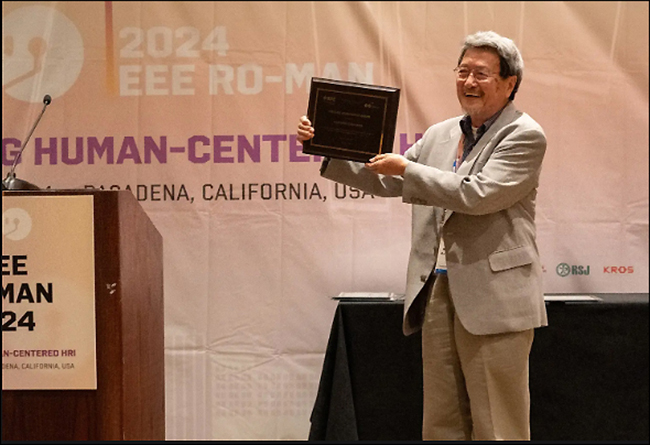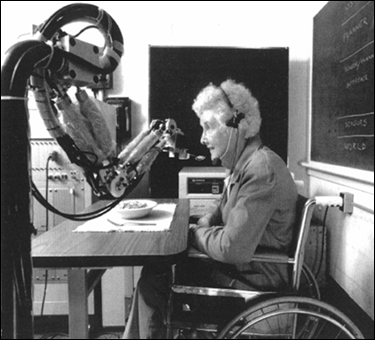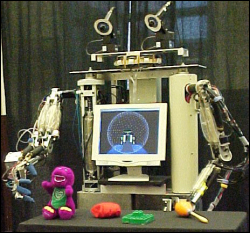
Kazuhiko Kawamura, professor emeritus of electrical and computer engineering, has been awarded a prestigious Lifetime Achievement Award at the 2024 IEEE International Conference on Robot and Human Interactive Communication (ROMAN) in Pasadena, California.
The ROMAN Lifetime Achievement Award recognizes Kawamura’s outstanding contributions to the field of robotics and human-robot interaction over the course of his distinguished career. Kawamura recently concluded a 43-year academic career at Vanderbilt. Prior to joining the School of Engineering, Kawamura was a research scientist from 1972 to 1981 at Battelle Columbus Laboratory.
“Kaz has been a pioneer in cognitive robotics and human-robot interaction. His work with the ISAC humanoid robot made a lasting impact in the field and helped build Vanderbilt’s footprint in robotics research,” said Vice Dean Nilanjan Sarkar, David K. Wilson Professor of Engineering. “At a personal level, Kaz has been a great mentor who is always willing to help junior faculty. I will always remember how he welcomed me into his research group when I joined Vanderbilt as an assistant professor.”

Kawamura is widely recognized for his pioneering work in cognitive systems and humanoid robots. His research has significantly advanced the development of intelligent robotic systems capable of learning, adapting, and interacting with humans in a natural and intuitive manner, which have laid the foundation for robots that understand and respond to human behaviors that are critical in collaborative environments such as health care, education and service industries.
In 1991, local and national media were invited to a public demonstration of ISAC (intelligent soft-arm control), a one-arm feeding robot prototype. “This was the world’s first demonstration of a force-feedback rehabilitation robot showcasing safety and softness,” Kawamura said. Another early robot he and his team designed was a bridge inspection robot named ROBIN (ROBotic INspection).

ISAC continued to grow—another arm, a head, and a computer screen for human-robot interaction. In fewer than two decades, Kawamura’s lab grew into the Center for Intelligent Systems and became one of three U.S. leaders in humanoid robotics, along with the MIT AI Lab and NASA’s Robonaut Group at the Johnson Space Center in Houston, Texas.
Kawamura’s interest turned to cognitive control and working memory for robots. In 2014, the IEEE established a Technical Committee on Cognitive Robots and Kawamura’s work on cognitive systems and humanoid robots has been adopted by leading researchers and institutions across the globe.
In addition to his technical achievements, Kawamura has been a pillar of the IEEE ROMAN community. He has served on numerous IEEE ROMAN conferences, playing an instrumental role in shaping the discourse on robotics and human-robot interaction. His commitment to fostering the next generation of researchers is well known, as he has mentored and advised young faculty members and scholars, offering guidance and support that has helped them flourish in their careers, reported the IEEE.
The IEEE award announcement cited Kawamura’s leadership and dedication, which have been vital in holding the ROMAN community together, promoting collaboration, and encouraging innovation. His service and mentorship have had a lasting impact, solidifying the ROMAN community’s reputation as a leading forum for the advancement of human-robot interaction research.
Contact: brenda.ellis@vanderbilt.edu